MBA Course Duration

MBA, or Master of Business Administration is usually a 2 year program spread across 4 semesters. It is a postgraduate program that equips students with both theoretical and practical skills in business management. It includes an overview of the MBA course duration and various business aspects.
Here’s some general information about MBA degree:

Duration
MBA course duration typically spans two years for full-time study. However, part-time, executive, and accelerated programs are also available, offering varying lengths of study.
MBA Specializations
Most Master of Business Administration (MBA) programs provide a range of specializations, enabling students to tailor their studies to areas like finance, marketing, human resources, entrepreneurship, and more.
Curriculum
MBA courses cover core subjects like accounting, finance, marketing, operations, strategy, and organizational behavior throughout the MBA course duration. Electives offer opportunities for deeper exploration of specific interests.
Admission Requirements
MBA Admissions typically requires a bachelor’s degree from an accredited institution, relevant work experience (sometimes), letters of recommendation, and a statement of purpose or essay.
Types of Programs
Besides the traditional full-time MBA (Master of Business Administration) degree, options include part-time MBA degrees, executive MBA courses for mid-career professionals, online MBA courses, and dual-degree programs that combine an MBA with another graduate degree, all varying in MBA course duration.
Networking and Alumni
In MBA Courses, networking opportunities with classmates, faculty, and alumni are invaluable. Strong alumni networks within MBA programs offer significant career advancement prospects.
Internships and Experiential Learning
MBA courses frequently incorporate internships, consulting projects, or experiential learning activities within the MBA course duration, providing students with practical exposure to real-world business challenges and fostering professional development.
Career Services and Placement
Most MBA (Master of Business Administration) programs provide career services to help students with job placement, resume writing, interview preparation, and networking opportunities with recruiters.
Accreditation
It’s essential to choose an MBA (Master of Business Administration) program that is accredited by recognized accrediting bodies to ensure the quality of education and increase the credibility of your degree.
Some of the most opted courses in India and St. Andrews collegeor different Engineering college or Management colleges are as follows:-
Best MBA Courses

In India, MBA specializations span a broad spectrum, accommodating diverse interests and career paths within the MBA course duration.
Here are few best MBA course specialisation:
International Business
The International Business MBA course is tailored to prepare graduates for the global market, emphasizing practices such as foreign trade, logistics, and global marketing management. This specialized MBA program equips students to excel in diverse fields such as finance, marketing, and logistics. Graduates of the International Business MBA often find opportunities with top recruiters including Accenture, TCS, and JP Morgan.
Information Technology
As IT remains a leading sector globally, an MBA in IT Management is increasingly popular. This specialization, within the MBA course duration, merges business management skills with IT expertise, addressing areas such as computer security, systems analysis, and IT infrastructure. Graduates often pursue careers in project management, business development, and IT consulting, with top recruiters including companies like Credit Suisse and Accenture.
Tourism Management
This business management specialization centres on the tourism and hospitality sector, encompassing subjects like global geography, travel organization, and destination management. Graduates can explore opportunities in tourism departments, travel agencies, and the hotel industry, with notable recruiters such as Thomas Cook.
Finance
The Finance MBA degree provides a detailed curriculum that starts with fundamental concepts of financial management and investment analysis. As part of this MBA specialisation, students delve deeper into corporate finance, banking, financial markets, and risk management, equipping them with the skills necessary for a successful career in finance.
Marketing
This MBA specialisation covers a range of topics including market research, brand management, digital marketing, advertising, consumer behaviour, and sales management.
Human Resource Management (HRM)
Human Resource Management MBA concentrates on managing people within organizations, including recruitment, training, performance evaluation, compensation, and employee relations.
Entrepreneurship
Provides knowledge and skills for starting and managing new ventures, including business planning, venture financing, innovation, and small business management.
Healthcare Management
Focuses on managing healthcare organizations, including healthcare policy, healthcare economics, healthcare delivery systems, and healthcare marketing.
Supply Chain Management
In the business world, the focus is on managing the flow of goods and services from their origin to consumption. This encompasses procurement, logistics, inventory management, and maintaining effective supplier relations.
Strategic Management
Business management focuses on developing and implementing strategies to achieve organizational goals and gain a competitive edge. This includes conducting strategic analysis, engaging in strategic planning, overseeing mergers and acquisitions, and upholding business ethics.
Digital Marketing
An MBA in Digital Marketing is a specialized program that blends traditional MBA coursework with an in-depth exploration of digital marketing strategies, technologies, and tools, all within the MBA course duration. This program is tailored to deepen understanding of modern business processes and equips students with the necessary knowledge and skills to thrive in the fast-paced digital marketing landscape.
Eligibility Criteria for MBA Courses in India

The eligibility criteria for MBA (Master of Business Administration) courses in India vary by institution and program, but common requirements often exist across many MBA programs. These include academic qualifications, work experience, and entrance exam scores, all considered within the framework of the MBA course duration.
Here are the general eligibility criteria:
Educational Qualification
Applicants must have a bachelor’s degree in any discipline from a recognized university or institution. Some programs may specify a minimum percentage or grade requirement in the undergraduate degree.
Minimum Marks
In MBA Courses, candidates are often required to meet a minimum aggregate score in their bachelor’s degree. This criterion varies across programs.
Entrance Exam
In MBA Course offerings in India, candidates generally must pass national or state-level entrance exams such as CAT, XAT, MAT, CMAT, or others, depending on specific institutional requirements.
Work Experience (Optional)
In certain MBA Course programs, prior work experience is preferred, particularly for executive MBA Course. However, admission criteria may vary, and many programs also accept fresh graduates.
English Language Proficiency
For candidates whose medium of instruction in the undergraduate program was not English, some institutions may require them to demonstrate proficiency in English through standardized tests like TOEFL (Test of English as a Foreign Language) or IELTS (International English Language Testing System).
Group Discussion (GD) and Personal Interview (PI)
After clearing the entrance exam, candidates may be required to participate in group discussions and personal interviews as part of the selection process for different MBA courses. These sessions are conducted to assess communication skills, leadership potential, and other interpersonal qualities.
Types of MBA Courses

MBA (Master of Business Administration) programs come in various types, catering to different career goals, academic backgrounds, and professional experiences.
Here are some common types of MBA courses:
Full-Time MBA
MBA courses, traditionally full-time with an MBA course duration of two years, are designed for students with minimal work experience or early-career professionals aiming for management roles. These programs offer comprehensive curricula that cover core business domains and often include internships or experiential learning opportunities.
Part-Time MBA
Part-time MBA courses are tailored for working professionals who wish to pursue an MBA while maintaining their careers. These programs allow students to attend classes in the evenings or on weekends, facilitating a balance between work and studies. Typically, the MBA course duration for part-time MBAs is longer than that of full-time programs.
Executive MBA (EMBA)
EMBA courses, or Executive MBA courses, are designed for seasoned professionals, specifically mid to senior-level executives. These programs are tailored to accommodate busy schedules, featuring weekend classes, online components, and residencies, all within the specified MBA course duration.
Online MBA
Online MBA courses provide flexibility for students who prefer remote learning or cannot attend traditional on-campus classes due to work or personal commitments. These courses deliver content through online platforms, allowing students to study at their own pace from any location with internet access. The MBA course duration varies, but online MBA programs often feature the same curriculum and faculty as their on-campus counterparts.
Specialized MBA
Specialized MBA courses target specific industries, functions, or areas of expertise, and are structured within the MBA course duration to provide focused, in-depth learning tailored to these specific fields.
Dual-Degree MBA Programs
Some universities offer dual-degree MBA courses that allow students to pursue an MBA concurrently with another graduate degree, such as a Master of Public Administration (MPA), Master of Science (MS), or Juris Doctor (JD). These interdisciplinary programs are designed within the MBA course duration to cater to students with diverse academic and professional interests.
Global MBA
MBA courses with a global focus incorporate international perspectives and experiences within the MBA course duration. These programs offer study abroad opportunities, international residencies, and facilitate cross-cultural collaboration, all designed to prepare students for careers in the global business landscape.
Accelerated MBA
Accelerated MBA courses compress the standard curriculum into a shorter MBA course duration, often allowing students to complete their degree in 12 to 18 months instead of the typical two years. These intensive programs require significant time commitment but enable quicker transition into the workforce.
Top MBA Courses Entrance Exams
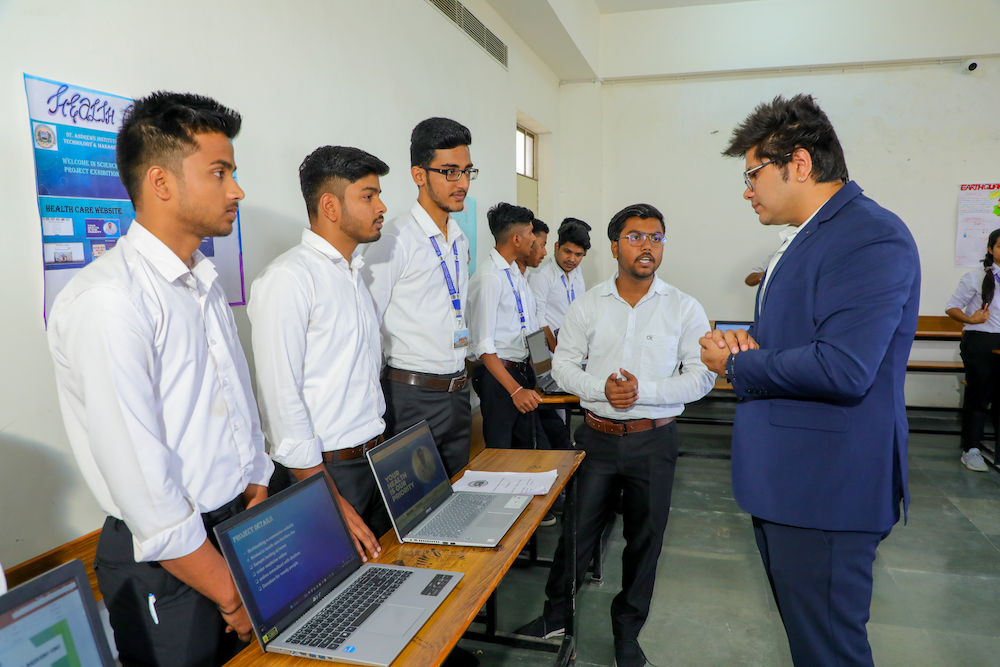
In India, several entrance exams are conducted for admission to MBA Courses offered by various Business School and universities.
Here are some of the top MBA entrance exams in India:
Common Admission Test (CAT)
CAT is one of the most prestigious and competitive MBA entrance exams in India. It is conducted annually by the Indian Institutes of Management (IIMs) and is accepted by numerous other top-tier management institutes across the country.
Xavier Aptitude Test (XAT)
XAT is conducted by XLRI Jamshedpur on behalf of Xavier Association of Management Institutes (XAMI). It is accepted by more than 150 B-schools in India and is known for its unique exam pattern, which includes sections on Decision Making and Essay Writing along with traditional sections.
Management Aptitude Test (MAT)
MAT is a national-level entrance exam conducted by the All India Management Association (AIMA) for admission to different MBA courses in various B-schools across India. It is held four times a year (February, May, September, and December) in both paper-based and computer-based modes.
Common Management Admission Test (CMAT)
CMAT is a national-level entrance exam conducted by the National Testing Agency (NTA) for admission to different MBA courses in AICTE-approved institutions across India. It is held once a year in January.
Indian Institute of Foreign Trade (IIFT) Entrance Exam
IIFT administers its own entrance exam for admission to its MBA course offered at its campuses in Delhi, Kolkata, and Kakinada.
Maharashtra Common Entrance Test (MAH-CET)
MAH-CET is conducted by the State Common Entrance Test Cell, Maharashtra, for admission to MBA/MMS programs offered by various MBA colleges in the state of Maharashtra.
Career Scope After MBA Degree
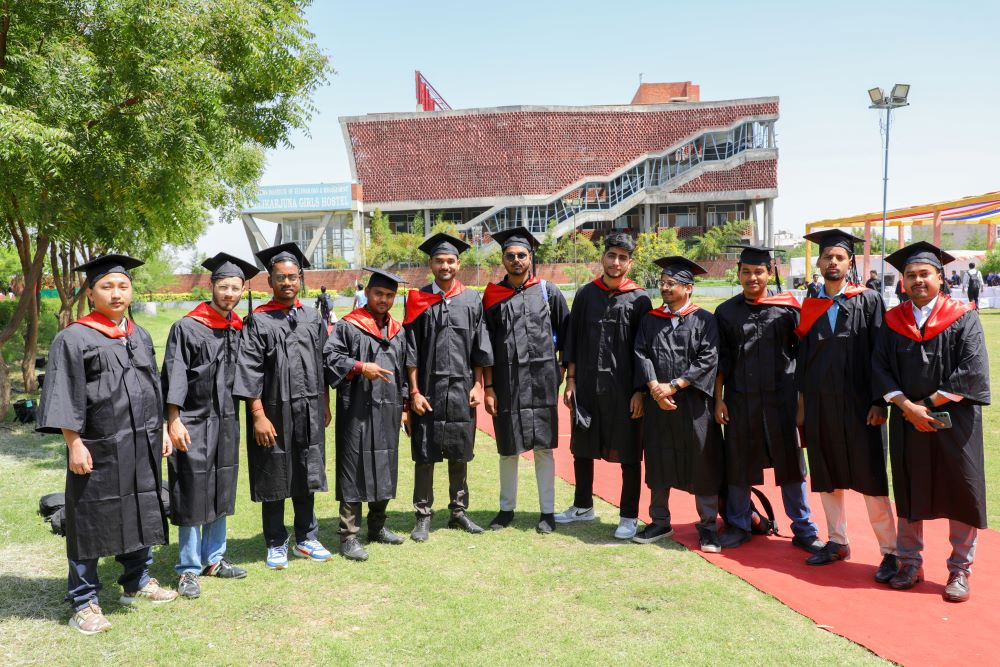
The career scope after obtaining an MBA degree is diverse and expansive, offering opportunities across various industries and sectors.
Here are some of the career paths and roles commonly pursued by MBA graduates:
Corporate Sector:
Management Consultant
Providing strategic advice to organizations on improving performance, solving problems, and achieving objectives.
Business Development Manager
Identifying and pursuing opportunities for growth, expansion, and partnerships.
Operations Manager
Overseeing the production, manufacturing, or service delivery processes within an organization to ensure efficiency and quality.
Marketing Manager
Developing and implementing marketing strategies to promote products or services and attract customers.
Finance Manager
Managing financial activities such as budgeting, forecasting, investment analysis, and financial reporting.
Human Resources Manager
Overseeing recruitment, training, performance management, and employee relations within an organization.
Entrepreneurship:
Startup Founder/Entrepreneur
Launching and managing one’s own business venture, from ideation and business planning to execution and growth.
Small Business Owner
Running a small-scale enterprise or franchise in various industries such as retail, food and beverage, consulting, or services.
Finance and Investment:
Investment Banker
Facilitating corporate finance transactions such as mergers and acquisitions, initial public offerings (IPOs), and private placements.
Financial Analyst
Analyzing financial data, preparing investment recommendations, and assessing the financial health of companies.
Portfolio Manager
Managing investment portfolios for individuals, institutions, or mutual funds to maximize returns and minimize risk.
Risk Manager
Identifying, assessing, and mitigating financial risks such as market risk, credit risk, and operational risk.
Consulting:
Strategy Consultant
Advising companies on strategic decisions related to market entry, competitive positioning, growth strategies, and organizational transformation.
Management Consultant
Providing expertise in areas such as operations, finance, marketing, and human resources to help clients solve complex business challenges.
Technology and IT:
Product Manager
Leading the development and launch of new products or services, from concept to market release, in technology companies or startups.
IT Consultant
Offering expertise in areas such as enterprise systems, digital transformation, cybersecurity, and IT strategy to help organizations leverage technology effectively.
Healthcare Management:
Healthcare Administrator/Manager
Overseeing the operations of hospitals, clinics, healthcare facilities, or pharmaceutical companies to ensure efficient delivery of healthcare services.
Healthcare Consultant
Providing advisory services to healthcare organizations on areas such as healthcare policy, regulatory compliance, quality improvement, and operational efficiency.
Nonprofit and Social Impact:
Nonprofit Manager
Leading nonprofit organizations or social enterprises focused on addressing societal issues such as education, poverty alleviation, environmental conservation, or healthcare access.
Social Entrepreneur
Creating innovative solutions to social and environmental challenges, blending business principles with social impact goals.
Government and Public Policy:
Government Administrator
Holding managerial positions in government agencies, public sector organizations, or international development agencies, overseeing policy implementation, program management, and public service delivery.
Jobs Profiles for MBA Graduates
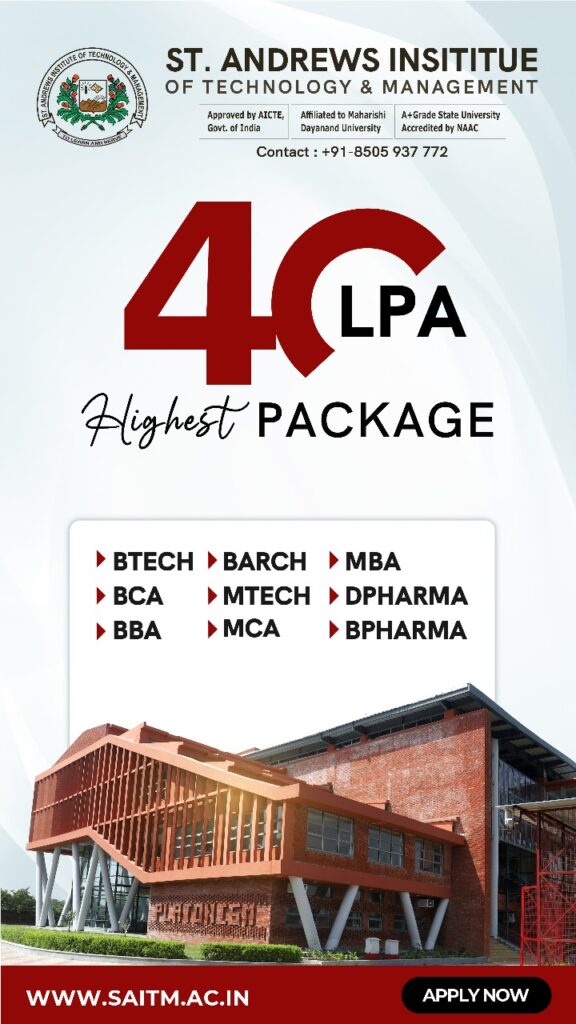
MBA scholars are highly sought after by employers across various industries for a wide range of job profiles.
Here are some common job profiles for MBA scholars:
Management Consultant
Management consultants provide strategic advice to organizations on improving performance, solving problems, and achieving objectives. They work with clients to identify opportunities for growth, operational improvement, cost reduction, and organizational transformation.
Business Development Manager
Business development managers identify and pursue opportunities for growth, expansion, and partnerships. They develop and implement strategies to increase revenue, enter new markets, and build relationships with clients, customers, and stakeholders.
Marketing Manager
Marketing managers develop and implement marketing strategies to promote products or services and attract customers. They conduct market research, analyze consumer behavior, and oversee advertising, branding, and promotional campaigns.
Finance Manager
Finance managers are responsible for managing financial activities such as budgeting, forecasting, investment analysis, and financial reporting. They ensure that the organization’s financial objectives are met and that financial resources are allocated effectively.
Operations Manager
Operations managers oversee the production, manufacturing, or service delivery processes within an organization to ensure efficiency and quality. They optimize processes, manage resources, and implement strategies to improve productivity and reduce costs.
Product Manager
Product managers lead the development and launch of new products or services, from concept to market release. They work closely with cross-functional teams, including engineering, marketing, and sales, to define product requirements, prioritize features, and drive product development efforts.
Human Resources Manager
Human resources managers oversee recruitment, training, performance management, and employee relations within an organization. They develop and implement HR policies and programs to attract, retain, and develop talent and ensure compliance with labor laws and regulations.
Supply Chain Manager
Supply chain managers oversee the end-to-end supply chain processes, including procurement, logistics, inventory management, and distribution. They optimize the flow of goods and services to meet customer demand while minimizing costs and maximizing efficiency.
Investment Banker
Investment bankers facilitate corporate finance transactions such as mergers and acquisitions, initial public offerings (IPOs), and private placements. They advise clients on capital raising, valuation, and transaction structuring, and help execute complex financial transactions.
Entrepreneur/Startup Founder
MBA degree holders often pursue entrepreneurship and start their own business ventures. They identify market opportunities, develop business plans, secure funding, and manage all aspects of the business to drive growth and success.
Top Recruiters for MBA Scholars

In India, top recruiters for MBA scholars vary depending on factors such as the reputation of the business schools, industry demand, and the economic climate. Here are some of the top recruiters for MBA scholars in India:
Consulting Firms:
McKinsey & Company
Boston Consulting Group (BCG)
Bain & Company
Deloitte Consulting
KPMG Advisory
EY Advisory
Accenture Strategy
AT Kearney
Financial Services and Investment Banks:
Goldman Sachs
J.P. Morgan
Morgan Stanley
Barclays
Citibank
HDFC Bank
ICICI Bank
Axis Bank
Technology and IT Services:
Infosys
Tata Consultancy Services (TCS)
Wipro
HCL Technologies
Capgemini
Accenture
IBM India
Microsoft India
E-commerce and Retail:
Amazon
Flipkart (Walmart-owned)
Reliance Industries (JioMart)
Myntra
Paytm
Snapdeal
Future Group
Aditya Birla Fashion and Retail
FMCG (Fast-Moving Consumer Goods):
Hindustan Unilever Limited (HUL)
Procter & Gamble (P&G)
Nestlé India
ITC Limited
PepsiCo India
Coca-Cola India
Britannia Industries
Marico Limited
Automotive and Manufacturing:
Tata Motors
Mahindra & Mahindra
Maruti Suzuki India
Hero MotoCorp
Larsen & Toubro (L&T)
Godrej Group
Ashok Leyland
Bajaj Auto
Healthcare and Pharmaceuticals:
Dr. Reddy’s Laboratories
Cipla
Sun Pharmaceutical Industries
Aurobindo Pharma
Apollo Hospitals
Fortis Healthcare
Max Healthcare
GlaxoSmithKline Pharmaceuticals
Telecommunications:
Bharti Airtel
Reliance Jio
Vodafone Idea
Tata Communications
BSNL (Bharat Sanchar Nigam Limited)
Aircel
Idea Cellular
Ericsson India
Energy and Utilities:
Reliance Industries Limited (Oil & Gas)
NTPC Limited (National Thermal Power Corporation)
Indian Oil Corporation Limited (IOCL)
Oil and Natural Gas Corporation Limited (ONGC)
Adani Power
Tata Power
Power Grid Corporation of India
Suzlon Energy
Real Estate and Infrastructure:
DLF Limited
Godrej Properties
Tata Realty and Infrastructure Limited
Oberoi Realty
Larsen & Toubro Realty
Brigade Group
Prestige Group
Shapoorji Pallonji Group
Specific Job Roles Associated with Certain MBA Specialization Subjects

Here’s a breakdown of specific industries or job roles associated with common MBA specialization subjects:
Finance:
Investment Banking
Roles such as Investment Banker, Financial Analyst, Equity Research Analyst, and Mergers & Acquisitions (M&A) Analyst are prevalent in investment banking firms, financial institutions, and corporate finance departments.
Corporate Finance
Opportunities include Financial Manager, Treasurer, Financial Controller, and Corporate Development Manager in various industries, managing financial activities within organizations.
Asset Management
Asset Managers, Portfolio Managers, and Wealth Managers manage investment portfolios for individuals, institutions, and funds in asset management firms and financial services companies.
Marketing:
Brand Management
Brand Managers, Product Managers, and Marketing Managers oversee branding strategies, product development, and marketing campaigns in consumer goods, retail, and advertising firms.
Digital Marketing
Digital Marketing Managers, Social Media Managers, and SEO/SEM Specialists lead online marketing efforts, including website optimization, social media engagement, and digital advertising campaigns in e-commerce, tech, and digital marketing agencies.
Market Research & Analytics
Market Research Analysts, Marketing Analysts, and Business Intelligence Managers gather and analyze market data, consumer trends, and competitive insights to inform marketing strategies in market research firms, consulting firms, and corporate marketing departments.
Operations Management:
Supply Chain Management
Supply Chain Managers, Logistics Managers, and Procurement Managers oversee the end-to-end supply chain process, including sourcing, manufacturing, transportation, and distribution, in manufacturing, retail, and logistics companies.
Quality Management
Quality Assurance Managers, Process Improvement Specialists, and Six Sigma Black Belts focus on improving product quality, operational efficiency, and process effectiveness in manufacturing and service industries.
Project Management
Project Managers, Program Managers, and Operations Managers lead project teams, manage project timelines and budgets, and ensure successful project delivery in various industries, including construction, IT, healthcare, and consulting.
Human Resource Management (HRM):
Talent Acquisition
HR Managers, Recruitment Specialists, and Talent Acquisition Managers are responsible for sourcing, attracting, and hiring top talent for organizations in all industries.
Employee Relations & Development
HR Business Partners, Training Managers, and Employee Relations Specialists focus on employee engagement, performance management, training, and organizational development initiatives in corporate HR departments and consulting firms.
Compensation & Benefits
Compensation Analysts, Benefits Managers, and Total Rewards Specialists design and manage compensation and benefits programs to attract, retain, and motivate employees in corporate HR departments, compensation consulting firms, and financial institutions.
Entrepreneurship–
Startup Founder
Entrepreneurs and Startup Founders launch and manage their ventures, leading all aspects of business development, product innovation, marketing, operations, and finance.
Small Business Owner
Small Business Owners establish and operate their businesses, such as restaurants, retail stores, consulting firms, or service providers, managing day-to-day operations and strategic growth.
Healthcare Management–
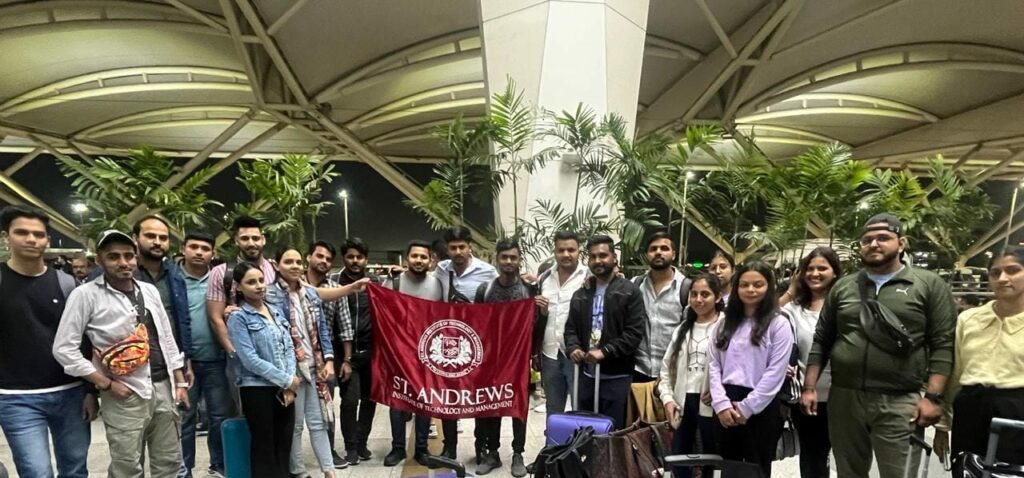
Hospital Administration
Hospital Administrators, Healthcare Managers, and Clinical Directors oversee hospital operations, healthcare delivery, and patient care services in hospitals, healthcare systems, and medical facilities.
Healthcare Consulting
Healthcare Consultants, Healthcare Analysts, and Healthcare Strategy Managers provide advisory services to healthcare organizations, government agencies, and healthcare technology firms, focusing on healthcare policy, strategy, and operational improvement.
Pharmaceutical Management
Pharmaceutical Product Managers, Market Access Managers, and Regulatory Affairs Specialists lead product development, market access strategies, and regulatory compliance efforts in pharmaceutical companies and biotech firms.
MBA Salary in India

The salary for individuals with an MBA in India can vary widely based on factors like the business schools attended, chosen specialization, work experience, industry, job role, and location. However, MBA holders in India typically earn higher salaries than those with undergraduate degrees.
Here’s an overview of the average MBA salary range in India:
Entry-Level Positions
For entry-level positions, such as management trainees or associate roles, MBA graduates in India can generally expect a salary ranging from INR 4 lakhs to INR 12 lakhs per annum. However, this figure can vary depending on factors such as the industry, company size, geographic location, and the reputations of the business schools from which the MBA was obtained.
Mid-Level Positions
For mid-level positions, individuals with an MBA degree in India typically receive salaries ranging from INR 10 lakhs to INR 25 lakhs per annum. However, this salary range can be influenced by factors such as industry, company size, geographic location, and the reputation of the business schools attended by these professionals. Graduates from prestigious business schools or those with specialized skills and experience may command higher salaries, potentially exceeding the upper limit of this range.
Senior-Level Positions
As MBA aspirant progress in their careers and take on leadership roles, their salaries tend to increase significantly. Senior-level positions such as senior manager, director, and vice president can offer salaries ranging from INR15 lakh to INR 40 lakh or more per annum, depending on the industry and company.
Specialized Industries

MBA specializations in investment banking, management consulting, private equity, and IT are typically associated with higher salaries. For professionals in these industries holding mid-level to senior-level positions, annual salaries can range from ₹20 lakh to ₹50 lakh or more.
Top Business Schools

Alumni from leading business schools like the Indian Institutes of Management (IIMs), Indian School of Business (ISB), and other prestigious institutions typically receive more lucrative salary offers than those from other schools. Salary offers for graduates from these top-tier institutions may vary from ₹20 lakh to ₹60 lakh or more per annum, contingent upon the specialization and industry.
Location

Compensation for individuals with an MBA can also fluctuate depending on the employment location. Major cities like Mumbai, Delhi, Bangalore, and Hyderabad often provide higher salaries than tier-2 or tier-3 cities.
MBA specializations in Business Analytics
The significance of MBA in Business Analytics lies in the growing importance of data-driven decision-making in modern business environments.
Here are several key reasons why pursuing an MBA in Business Analytics is significant:
Meeting Industry Demand

With the abundance of data in today’s digital landscape, there’s a growing need for experts capable of analyzing and interpreting data to inform business strategy and decision-making.
Enhanced Decision-Making
Experts who focus on analyzing data in the realm of business help organizations extract valuable insights from large datasets. Their expertise supports informed decision-making across various domains such as marketing, finance, operations, and human resources, thereby improving the effectiveness of organizational decision-making processes.
Competitive Advantage
Enterprises that skillfully leverage data analysis achieve a competitive edge in the market. Experts with a focus in this domain have the proficiency to examine market trends, understand customer behaviour, and assess operational effectiveness, empowering their organizations to uphold a competitive advantage.
Targeted Marketing and Customer Insights
MBA in Business Analytics facilitates companies in comprehending their customers’ preferences, behaviours, and needs via data analysis. Professionals with a specialization in Business Analytics aid organizations in crafting targeted marketing campaigns, refining customer segmentation strategies, and elevating customer satisfaction and retention.
Risk Management and Fraud Detection
Analyzing data can help identify potential risks and detect fraudulent activities within organizations. MBA professionals with expertise in Business Analytics can develop predictive models, implement risk management strategies, and detect anomalies in financial transactions, thereby safeguarding the organization’s assets and reputation.
Optimized Operations and Efficiency
Business Analytics can optimize operational processes and improve efficiency by identifying areas for cost reduction, streamlining workflows, and predicting demand patterns. MBA graduates specializing in this particular field can drive operational excellence within their organizations by leveraging data-driven insights to optimize resource allocation and enhance productivity.
Innovation and Business Growth

Data analytics can uncover opportunities for innovation and business growth by identifying emerging market trends, untapped customer segments, and new product or service offerings. MBA professionals with this specialization can lead innovation initiatives, develop data-driven strategies, and drive organizational growth.
Future Opportunities
Specializing in Business Analytics can open up a wide range of job opportunities for MBA graduates, including roles such as data analyst, business intelligence analyst, data scientist, analytics manager, and strategy consultant. These roles are in high demand across industries and offer competitive salaries and career advancement opportunities.
Top MBA Colleges for Specialization in Business Analytics
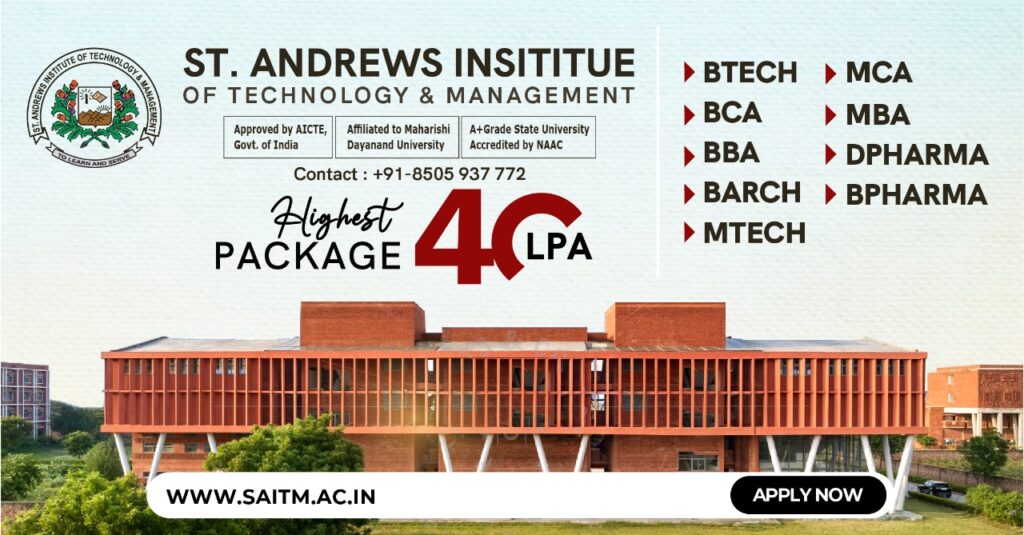
In India, there are several top business schools and institutions offering MBA course with specializations in Business Analytics.
Here are some top MBA colleges known for their MBA in Business Analytics:
Indian Institutes of Management (IIMs)
Several IIMs offer MBA course with specializations or electives in Business Analytics. Some IIMs known for their focus on analytics include IIM Ahmedabad, IIM Bangalore, IIM Calcutta, IIM Lucknow, and others.
St. Andrews Institute of Technology & Management (SAITM)

MBA in Business Analytics at St. Andrews Institute of Technology & Management (SAITM) is designed to equip students with the skills and knowledge required to leverage data-driven insights for strategic decision-making and business growth. This specialization combines core business management principles with advanced analytics techniques, preparing students for roles at the intersection of business and technology.
Indian Institute of Technology (IITs)
Some IITs offer MBA course with concentrations in Business Analytics or related fields. For example, IIT Kharagpur offers MBA course with a specialization in Business Analytics.
Faculty of Management Studies (FMS), University of Delhi
FMS Delhi, affiliated with the University of Delhi, offers MBA course with elective courses in Business Analytics. FMS Delhi is known for its affordable fees and strong industry connections.
Indian Institute of Science (IISc) Bangalore
DMS at IISc Bangalore offers MBA course with a specialization in Business Analytics. The program emphasizes data-driven decision-making and analytics skills.
Xavier School of Management (XLRI), Jamshedpur:
XLRI offers an Executive Development Program in Business Analytics (EDPBA) for working professionals. The program covers topics such as data mining, predictive modeling, and business intelligence.
Department of Industrial and Management Engineering (IME), Indian Institute of Technology (IIT) Kanpur
IME at IIT Kanpur offers MBA course with elective courses in Business Analytics.
Indian Institute of Management (IIM) Kashipur
IIM Kashipur offers MBA course with elective courses in Business Analytics. The program aims to equip students with analytical skills and tools to solve complex business problems.
MBA Specialization in Finance

The popularity of MBA in Finance as a specialization can be attributed to several key reasons:
Lucrative Career Opportunities
MBA in Finance is one of the highest-paying sectors globally, offering lucrative future opportunities. MBA graduates specializing in finance often find roles in investment banking, corporate finance, asset management, private equity, hedge funds, and financial consulting, among others.
Global Demand

Finance skills are in demand across various industries and sectors, making it a versatile specialization with global applicability. Whether in developed or emerging markets, companies require finance management professionals to manage their financial operations effectively.
Prestigious and High-Profile Roles
Finance professionals often hold prestigious and high-profile roles within organizations. They are involved in critical decision-making processes, strategic planning, mergers and acquisitions, capital raising, and financial risk management, contributing significantly to the success of their organizations.
Intellectual Challenge

Finance is a dynamic and intellectually challenging field that requires analytical thinking, problem-solving skills, and a deep understanding of financial concepts and markets. Pursuing an MBA in Finance allows students to engage with complex financial theories and models, enhancing their analytical and quantitative skills.
Opportunities for Advancement
Finance offers ample opportunities for career advancement and progression. With the right skills and experience, finance professionals can climb the corporate ladder quickly and attain senior leadership positions such as Chief Financial Officer (CFO), Treasurer, or Financial Director.
Global Recognition
MBA course specializing in finance offered by top business schools are globally recognized and highly regarded by employers. Graduates from these programs often have a competitive edge in the job market and are sought after by leading companies and financial institutions.
Networking Opportunities
MBA programs in finance provide students with valuable networking opportunities with faculty, alumni, industry experts, and fellow students. Building a strong professional network can open doors to job opportunities, mentorship, and collaboration in the finance industry.
Career Flexibility

Finance skills are transferable across industries and sectors, offering career flexibility and mobility. MBA graduate specializing in finance can pursue diverse career paths, including roles in investment banking, corporate finance, consulting, entrepreneurship, and more.
Top MBA Colleges for Specialization in Finance

Here are some of the top business schools for MBA in Finance in India:
Indian Institute of Management (IIM)
IIM offers an MBA (Master of Business Administration) program with a focus on MBA Finance, providing students with a comprehensive understanding of financial concepts, markets, and strategies. The institute’s finance faculty and research centers contribute to its reputation in finance education.
St. Andrews Institute of Technology & Management {SAITM}
MBA in Finance at St. Andrews Institute of Technology & Management (SAITM) is designed to provide students with a comprehensive understanding of financial management principles and practices. MBA Finance prepares students for careers in various sectors of finance, including banking, investment management, corporate finance, and financial consulting.
Indian Institute of Foreign Trade (IIFT), Delhi and Kolkata
IIFT offers an MBA in Global Commerce program with a specialization in finance. The institute’s robust emphasis on global finance and trade positions it as a top choice for students aiming for careers in international finance.
Faculty of Management Studies (FMS), Delhi University
FMS Delhi offers MBA course with specializations in finance, marketing, operations, and other areas. The institute’s rigorous curriculum and low fee structure make it an attractive option for students seeking quality education in finance.
Jamnalal Bajaj Institute of Management Studies (JBIMS), Mumbai
JBIMS, affiliated with the University of Mumbai, offers MBA course with a finance specialization. The institute’s strong industry connections and location in Mumbai, the financial capital of India, provide students with excellent exposure to the finance industry.
Indian Institutes of Technology (IITs)
Some IITs, such as IIT Delhi and IIT Bombay, offer MBA programs with specializations in finance. While these programs may not be as established as those offered by IIMs, they provide students with a solid foundation in finance concepts and management principles.
MBA in Public Policy Management
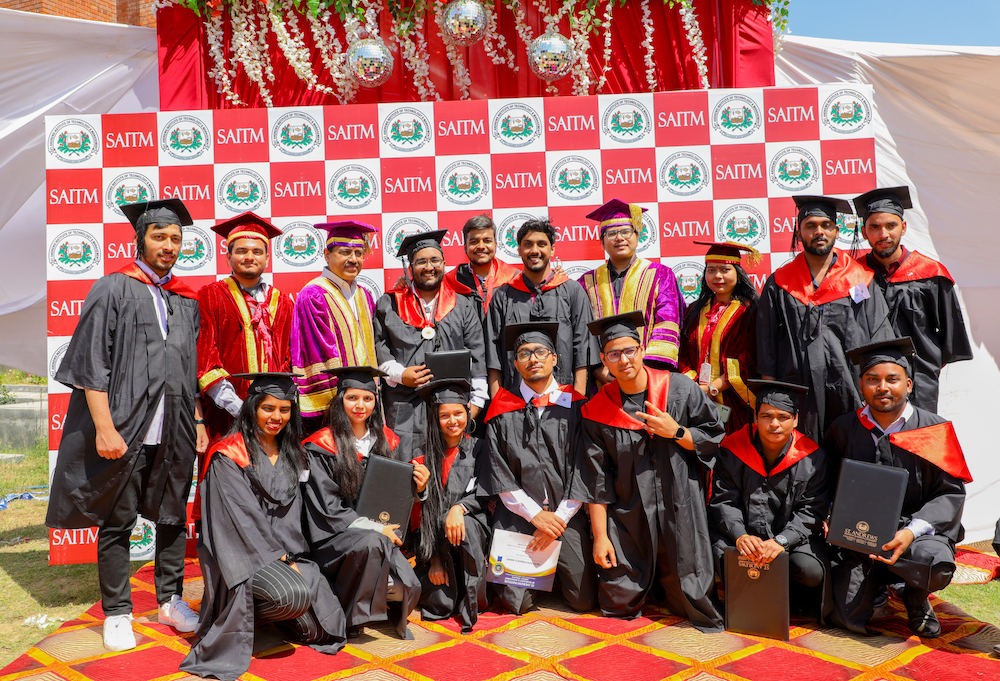
MBA in Public Policy Management is a specialized program designed to equip students with the knowledge and skills required to address complex public policy challenges and contribute to effective governance in both public and nonprofit sectors.
Here’s an overview of this program:
Curriculum:
The curriculum typically covers a wide range of topics, including public policy analysis, policy formulation and implementation, public administration, regulatory affairs, public finance, political economy, and stakeholder management. Courses may also focus on specific policy areas such as healthcare, education, environmental sustainability, and urban development.
Interdisciplinary Approach
MBA programs in Public Policy Management often take an interdisciplinary approach, drawing insights from fields such as economics, political science, sociology, law, and management. This multidisciplinary perspective enables students to understand the complex interplay of factors shaping public policy decisions and outcomes.
Analytical Skills
Students develop strong analytical skills, including quantitative and qualitative research methods, data analysis, cost-benefit analysis, and policy evaluation techniques. These analytical skills are essential for assessing the effectiveness and impact of public policies and informing evidence-based decision-making.
Leadership and Management Skills
The program emphasizes the development of leadership and management skills necessary for effective policy advocacy, implementation, and governance. Students learn strategic planning, negotiation, communication, and stakeholder engagement techniques to navigate the complexities of the policy-making process.
Real-World Experience
Many MBA programs in Public Policy Management offer opportunities for internships, fieldwork, and capstone projects in collaboration with government agencies, nonprofit organizations, think tanks, and advocacy groups. These practical experiences allow students to apply their knowledge and skills to real-world policy challenges and gain valuable hands-on experience.
Global Perspective
With increasing globalization and interconnectedness, MBA programs in Public Policy Management often include a global perspective, exploring international and comparative approaches to public policy and governance. Students examine global trends, cross-border policy issues, and the role of international institutions in shaping public policy agendas.
Career Opportunities
Graduates of MBA programs in Public Policy Management pursue diverse career paths in government agencies, nonprofit organizations, international organizations, consulting firms, research institutes, advocacy groups, and corporate social responsibility departments. They may work as policy analysts, program managers, government relations specialists, public affairs consultants, or social entrepreneurs, among other roles.
Top MBA Colleges for Specialization in Public Policy Management
Here are some of the top business schools for MBA in India to pursue MBA in Public Policy Management:
Indian Institute of Management {IIM}
IIM offers an Executive Post Graduate Programme in Management (EPGP) with a specialization in Public Policy. The program is designed for mid-career professionals and senior executives interested in developing leadership skills in public policy and governance.
St. Andrews Institute of Technology & Management [SAITM]

MBA in Public Policy Management at St. Andrews Institute of Technology & Management (SAITM) is a specialized program designed to prepare students for leadership roles in the public sector, nonprofit organizations, and international agencies
Indian Institute of Technology (IIT) Delhi :
IIT Delhi’s MBA course covers various management domains, including Public Policy and Governance. The institute’s interdisciplinary approach combines management education with insights from engineering, social sciences, and policy studies.
Indian Institute of Technology (IIT) Madras
IIT Madras offers MBA degree with a specialization in Public Policy and Management. The program focuses on policy analysis, regulatory affairs, and governance issues, preparing students for careers in government, nonprofits, and consulting firms.
Indian Institute of Technology (IIT) Kharagpur – Vinod Gupta School of Management
IIT Kharagpur’s MBA program includes elective courses in Public Policy and Management. The institute’s strong engineering and management expertise provides students with a unique perspective on policy challenges in technology-intensive sectors.
National Institute of Public Finance and Policy (NIPFP)
While not following the traditional model of different business schools, NIPFP offers Executive Education programs in Public Policy and Management. The institute’s focus on fiscal policy, economic reforms, and public finance makes it a valuable resource for professionals looking to deepen their understanding of policy issues.
MBA in Operations Management

An MBA specialization in this field is a specialized program designed to equip students with the knowledge and skills necessary to effectively manage the production processes, supply chains, and operations of organizations.
Here’s an overview of the MBA specialization in Operations Management:
Core Curriculum:
Operations Strategy
Students learn how to develop strategies to optimize production processes, improve efficiency, and enhance competitiveness.
Supply Chain Management
The curriculum covers topics such as procurement, inventory management, logistics, distribution, and supply chain optimization.
Quality Management
Students learn about quality control methodologies, continuous improvement techniques, and best practices for ensuring product and service quality.
Process Optimization
Courses focus on analyzing and improving operational processes to maximize productivity, minimize waste, and enhance value creation.
Project Management
Students learn project management principles and techniques for planning, executing, and controlling projects to achieve organizational objectives.
Operations Analytics
The program includes courses on data analysis and operations research techniques for making data-driven decisions and optimizing operations.
Lean Six Sigma
Students are introduced to Lean Six Sigma methodologies for process improvement, defect reduction, and performance optimization.
Career Opportunities:
Graduates of MBA in this specialization programs are well-positioned for a wide range of job opportunities in various industries and sectors. Common job roles include Operations Manager, Supply Chain Manager, Logistics Manager, Production Manager, Quality Assurance Manager, Project Manager, and Operations Consultant.
Skills Development:
Throughout the program, students develop a range of skills essential for success in management roles, including analytical skills, problem-solving skills, project management skills, communication skills, leadership skills, and cross-functional collaboration skills.
Industry Relevance:
MBA in this specialization are designed to address the evolving needs and challenges of today’s global trade environment. With increasing globalization, technological advancements, and changing consumer preferences, operation management plays a critical role in driving organizational success and competitive advantage.
Top MBA Colleges for MBA in Operations management
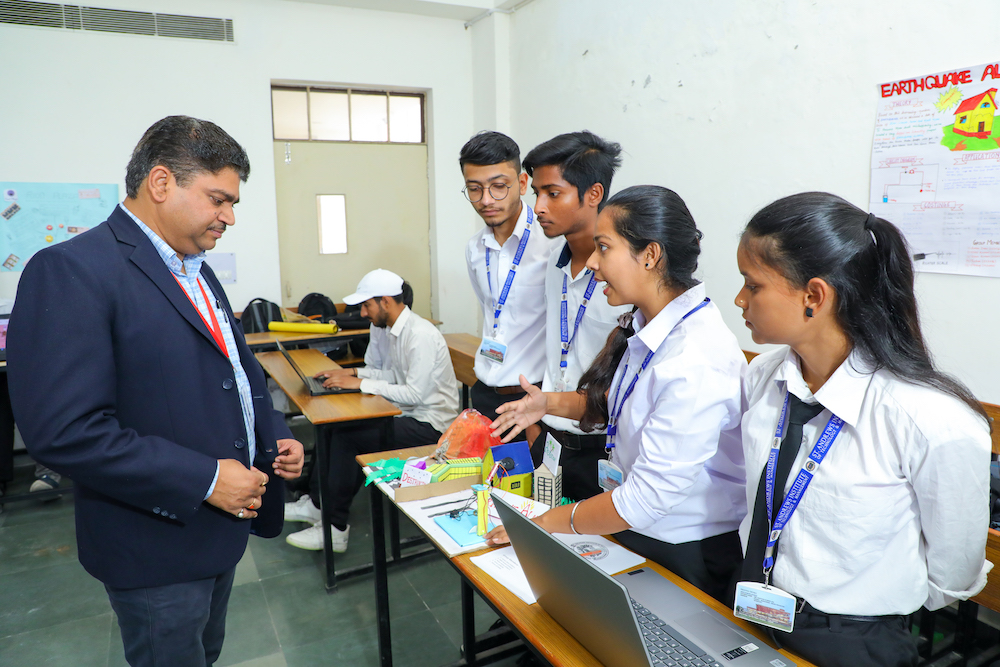
In India, Indian Institutes of Management (IIMs), are highly regarded for their MBA programs.
Here are some of the top business schools for MBA to pursue specialization in Operations management in India:
Indian Institute of Management (IIM):
IIM is one of the premier business schools in India and offers an MBA program with a strong emphasis. The institute’s rigorous curriculum and industry connections make it a top choice for MBA aspirants.
St. Andrews Institute of Technology & Management (SAITM):
Operations Management MBA at St. Andrews Institute of Technology & Management (SAITM)is a specialized program designed to equip students with the knowledge and skills needed to oversee the production and delivery of goods and services efficiently and effectively.
Indian Institute of Technology (IIT) Delhi:
IIT Delhi’s Department of Management Studies offers an MBA program covering various management domains. The institute’s emphasis on technology and management prepares students for challenges in operations.
Faculty of Management Studies (FMS), Delhi University
FMS is one of the oldest and most reputed management institutes in India. It offers an MBA program with various specializations, including Operations Management.
Jamnalal Bajaj Institute of Management Studies (JBIMS), Mumbai
JBIMS is affiliated with the University of Mumbai and offers an MBA program with Operations Management as one of the specialization options.
MBA in Human Resource Management
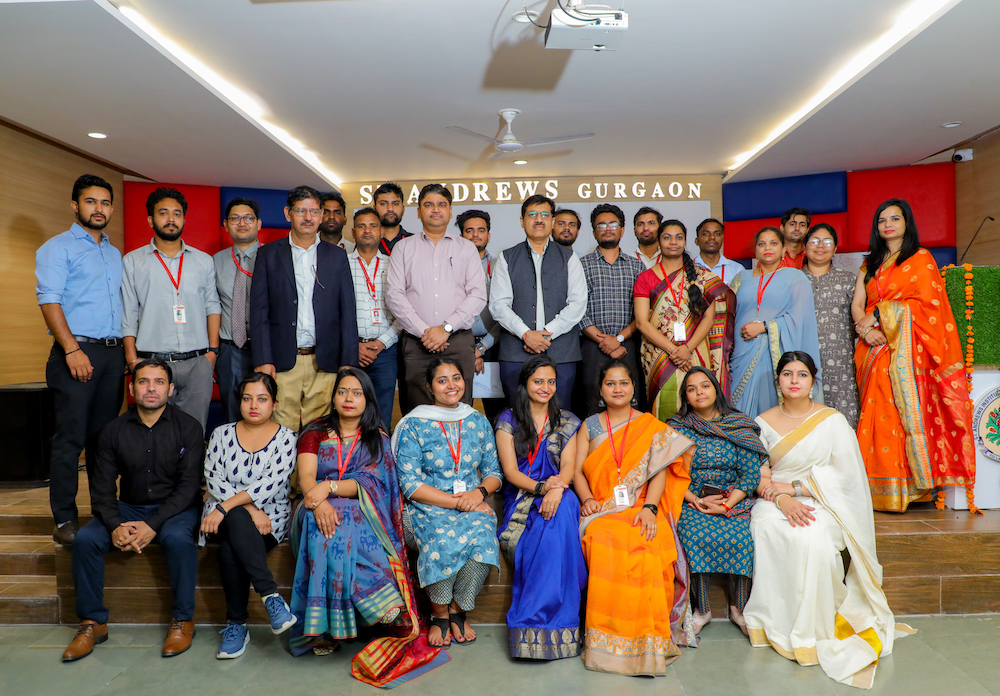
MBA in HRM is a specialized program designed to prepare students for leadership roles in managing the human capital of organizations.
Here’s a brief overview of what this program typically entails:
Curriculum–
The curriculum covers a wide range of topics related to human resource management, including recruitment and selection, performance management, compensation and benefits, training and development, employee relations, and HR strategy. Students also study management principles, organizational behavior, and labor laws.
Talent Acquisition
Students learn how to attract, recruit, and select the right talent for organizations. They study recruitment strategies, job analysis techniques, interviewing skills, and assessment methods to identify and hire candidates who fit the organization’s culture and strategic objectives.
Performance Management
The program emphasizes the importance of managing employee performance to achieve organizational goals. Students learn how to set performance expectations, conduct performance appraisals, provide feedback, and develop performance improvement plans to enhance employee productivity and engagement.
Compensation and Benefits
Students study the design and administration of compensation and benefits programs to attract, retain, and motivate employees. They learn about salary structures, incentive plans, employee benefits, and equity considerations to ensure fair and competitive compensation practices.
Training and Development
The program explores the role of training and development in building employee skills and capabilities. Students learn how to assess training needs, design training programs, deliver training sessions, and evaluate training effectiveness to support employee growth and development.
Employee Relations
Students develop skills in managing employee relations and resolving workplace conflicts. They study labor laws, employee rights, disciplinary procedures, grievance handling, and dispute resolution techniques to maintain positive employee relations and minimize legal risks.
HR Strategy and Leadership
The program focuses on developing strategic HR leaders who can align HR practices with organizational goals and drive organizational change. Students learn about HR strategy formulation, change management, leadership development, and HR analytics to enhance organizational effectiveness and competitiveness.
Career Opportunities–
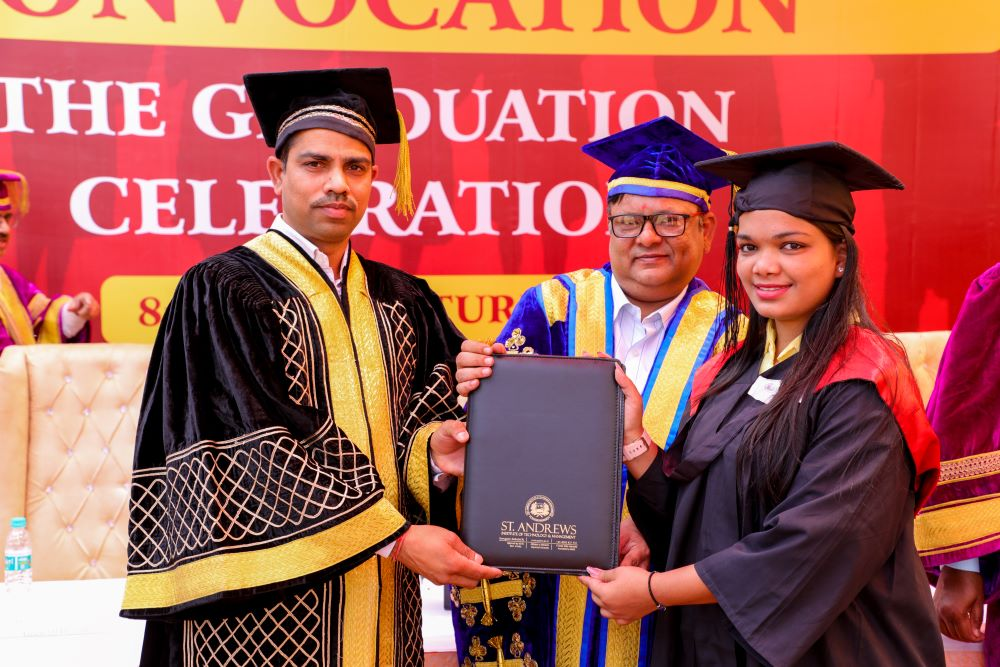
Graduates who pursue MBA programs in Human Resource Management explore diverse career paths in HR departments of organizations across industries. They may work as HR managers, talent acquisition specialists, training and development managers, compensation and benefits analysts, employee relations managers, or HR consultants.
Top Colleges for MBA in Human Resource Management
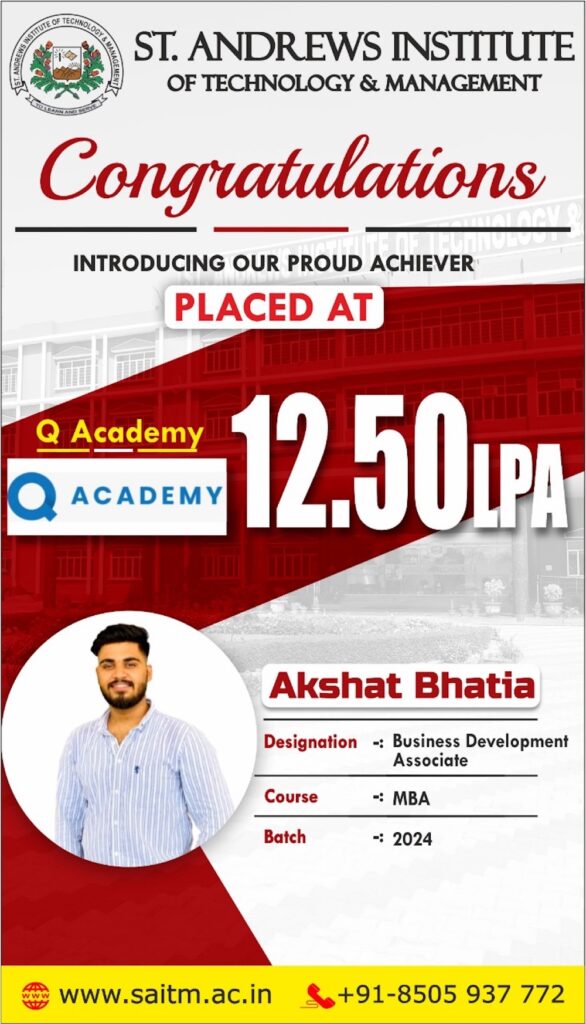
In India, business schools offering MBA programs with a specialization in Human Resource Management (HRM) are highly regarded for their academic excellence and industry relevance.
Here are some of the top business schools in India for MBA in Human Resource Management:
Indian Institute of Management [IIM]
IIM offers an MBA program with a specialization in Human Resource Management. The institute’s strong faculty and research initiatives in HRM make it a preferred choice for students interested in this field.
St. Andrews Institute of Technology & Management (SAITM) –
MBA in Human Resource Management at St. Andrews Institute of Technology & Management (SAITM) is a specialized program designed to prepare students for leadership roles in managing the human capital of organizations
Indian Institute of Technology (IIT) Delhi–
IIT Delhi offers an MBA program covering various management domains, including Human Resource Management. The institute’s interdisciplinary approach and strong industry connections provide students with a holistic understanding of HRM practices.
Indian Institute of Technology (IIT) Kharagpur – Vinod Gupta School of Management:
IIT Kharagpur offers an MBA program with a focus on HRM. The institute’s emphasis on technology and management integration, along with its strong engineering expertise, provides students with a unique perspective on HRM challenges in technology-intensive sectors.
National Institute of Industrial Engineering (NITIE), Mumbai
NITIE offers an MBA program with elective courses in HRM. The institute’s specialization in industrial engineering complements its HRM curriculum, preparing students for roles at the intersection of HR and operations.
Xavier School of Management (XLRI), Jamshedpur
While XLRI is a private institution, it is worth mentioning for its flagship HRM program. XLRI offers an MBA in Human Resource Management (HRM) and has a strong reputation for its HRM curriculum, faculty expertise, and industry connections.
Indian Institute of Technology (IIT) Madras:
DMS, IIT Madras, provides an MBA program with elective courses in HRM. The institute’s emphasis on innovation and technology complements its HRM curriculum, equipping students for HR roles in technology-driven industries.
MBA in International Business

MBA in International Business is a specialized program designed to prepare students for leadership roles in global enterprises and multinational corporations.
Here’s a brief overview of what this program typically entails:
Curriculum:-
The curriculum covers a wide range of topics related to Global trades, including global markets, international trade, cross-cultural management, international finance, global supply chain management, and international marketing. Students also study management principles, strategic planning, and business analysis.
Global Markets and Trade
Students learn about the dynamics of global markets, international trade theories, trade agreements, tariffs, and trade barriers. They study how political, economic, social, and technological factors influence Global trade operations and market entry strategies.
Cross-Cultural Management
The program emphasizes the importance of understanding cultural differences and managing diversity in global trade environment. Students learn how to navigate cultural nuances, communicate effectively across cultures, and build multicultural teams.
International Finance
Students study international financial markets, exchange rate mechanisms, foreign exchange risk management, international investment strategies, and capital budgeting decisions in a global context. They learn how to analyze financial data, assess risks, and make informed financial decisions in Global trade settings.
Global Supply Chain Management
The program explores the complexities of global supply chains, including sourcing, procurement, production, distribution, and logistics. Students learn how to optimize supply chain operations, manage global suppliers, and mitigate supply chain risks in diverse cultural and regulatory environments.
International Marketing
Students learn about international marketing strategies, market research techniques, product adaptation, pricing strategies, distribution channels, and global branding. They study how to develop and implement marketing plans that resonate with diverse consumer preferences and cultural norms.
Global Strategy and Leadership
The program focuses on developing strategic leaders who can navigate the complexities of Global trade environments. Students learn about global business strategy formulation, strategic alliances, mergers and acquisitions, and corporate governance in a global context.
Future Scope
Graduates who enroll in MBA programs in Global Commerce pursue diverse careers in global companies, multinational corporations, international organizations, consulting firms, and government agencies. They may occupy roles such as Global Trade Manager, Global Marketing Manager, International Trade Specialist, Supply Chain Manager.
Top MBA Colleges for MBA in International Business
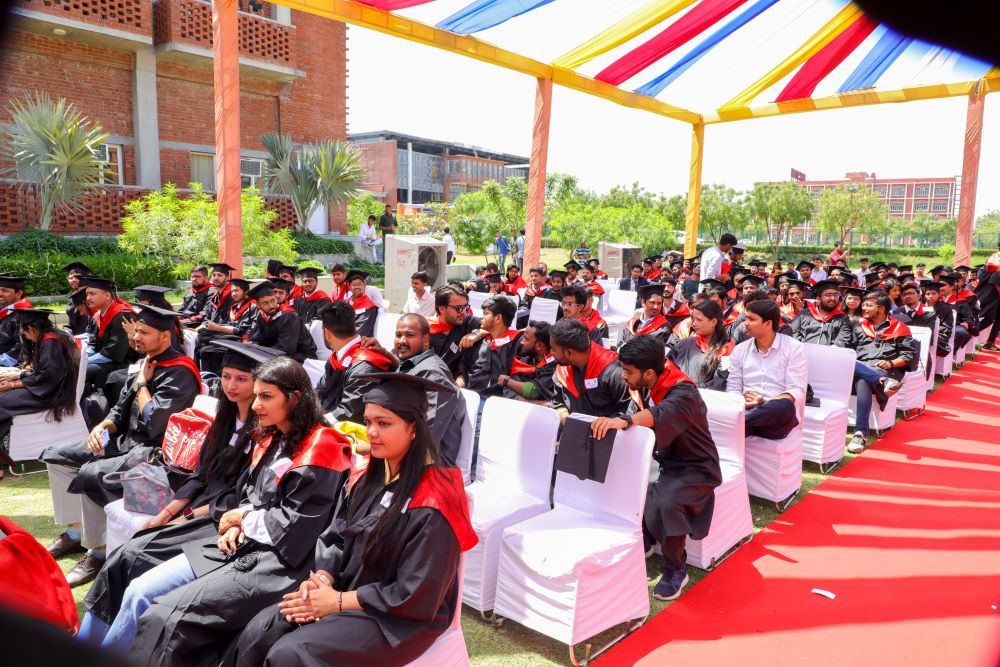
In India, colleges offering MBA programs with a specialization in International Business are highly regarded for their academic excellence and industry relevance.
Here are some of the top business schools in India for MBA in International Business:
Indian Institute of Foreign Trade (IIFT), New Delhi
IIFT is one of the premier business schools in India and offers an MBA degree dedicated exclusively to international business education and research. The institute offers a flagship MBA in International Business program known for its rigorous curriculum, faculty expertise, and industry connections.
St. Andrews Institute of Technology & Management (SAITM) :

MBA in International Business at St. Andrews Institute of Technology & Management (SAITM) is a specialized program designed to equip students with the knowledge and skills needed to navigate the complexities of global business environments.
Department of Commerce, Delhi School of Economics, University of Delhi
The Department of Commerce at Delhi School of Economics offers an MBA in International Business (IB) program. The program focuses on international trade, finance, marketing, and strategy, preparing students for careers in global business environments.
Indian Institute of Management Lucknow (IIML)
IIML offers an MBA program with a specialization in International Business. The institute’s comprehensive curriculum, industry collaborations, and experiential learning opportunities prepare students for leadership roles in global enterprises.
Indian Institute of Technology (IIT) Delhi :-
IIT Delhi’s MBA program incorporates elective courses in International Business. The institute’s interdisciplinary approach, robust industry connections, and emphasis on managing technology offer students a comprehensive understanding of global business dynamics.
Indian Institute of Technology (IIT) Madras–
DMS, IIT Madras, presents an MBA program with elective courses in International Business. The institute’s focus on innovation and managing technology aligns with its Global trade curriculum, equipping students for leadership positions on the global stage.
Indian Institute of Foreign Trade (IIFT), Kolkata Campus
Apart from its Delhi campus, IIFT also has a Kolkata campus that offers an MBA in International Business program. The Kolkata campus provides students with similar opportunities for international exposure, industry interactions, and global career opportunities.
FAQs
What is MBA Course Duration?
The MBA course duration typically ranges from 1 to 2 years, depending on the program format and the MBA specialization selected, with full-time programs usually lasting about 2 years.
Why is MBA popular among students and working professionals?
MBA programs are popular due to their ability to enhance career advancement, skill development, and networking opportunities, along with higher earning potential and access to diverse industries and job roles, all within the MBA course duration.
Who Should Opt for an MBA Human Resources Course?
An MBA in HRM is the perfect choice for those with strong organizational skills, offering training that covers the MBA course duration and provides essential knowledge and skills to effectively manage both core business issues and HR-related challenges.
Who Should Opt for the MBA Family Business Course?
The next generation of family business leaders looking to modernize their enterprises should consider enrolling in a family MBA program. This option, detailing the MBA course duration, is ideal for those aiming to cultivate entrepreneurial ideas within a family business context.
How do MBA course subjects help in developing managerial skills?
MBA course subjects, spanning the MBA course duration, offer theoretical knowledge, practical skills, and case-based learning. These elements foster critical thinking, strategic decision-making, leadership, managerial abilities, and effective communication, all crucial for managerial roles.
How long does it take to complete an online MBA?
The MBA course duration for online programs typically spans 1.5 to 2 years, although accelerated or part-time options may differ.
What is MBA Specialisations?
MBA specializations are distinct paths within a Master of Business Administration program, allowing students to concentrate on specific sectors.
Covering the MBA course duration, these specializations address various professional needs and industry demands, from finance and marketing to technology and healthcare management.
Students can select from these diverse MBA specializations to customize their education according to their career goals and deepen their knowledge in specific areas.





